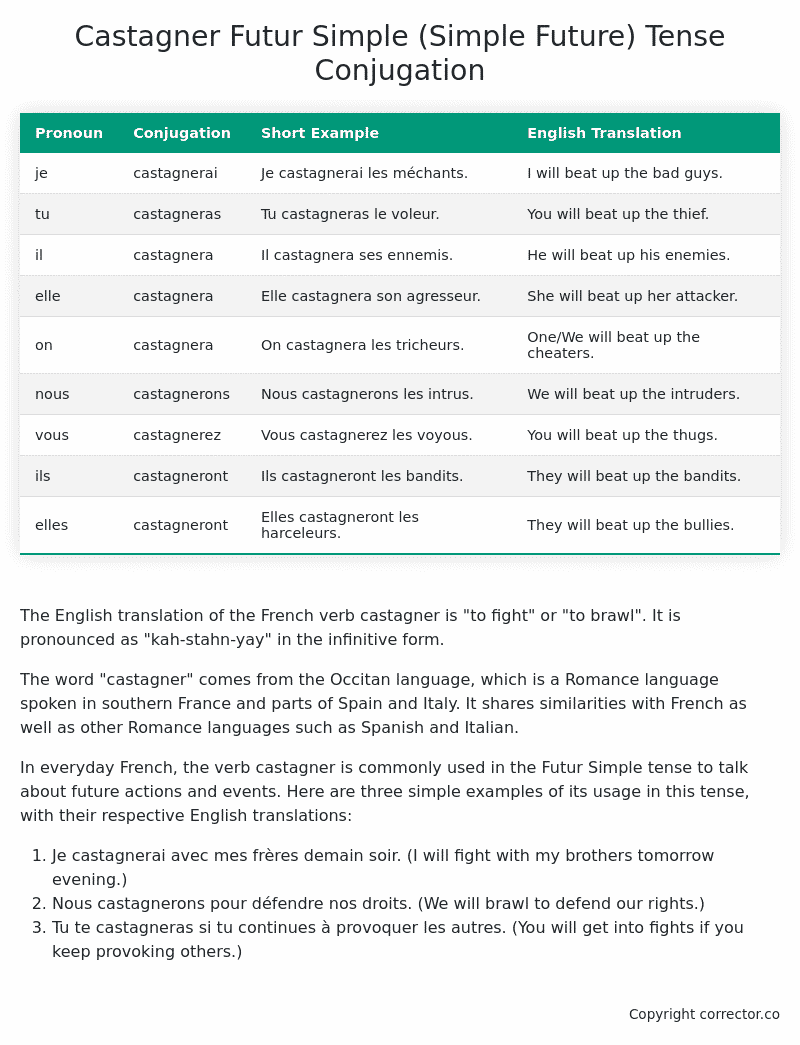Futur Simple (Simple Future) Tense Conjugation of the French Verb castagner
Introduction to the verb castagner
The English translation of the French verb castagner is “to fight” or “to brawl”. It is pronounced as “kah-stahn-yay” in the infinitive form.
The word “castagner” comes from the Occitan language, which is a Romance language spoken in southern France and parts of Spain and Italy. It shares similarities with French as well as other Romance languages such as Spanish and Italian.
In everyday French, the verb castagner is commonly used in the Futur Simple tense to talk about future actions and events. Here are three simple examples of its usage in this tense, with their respective English translations:
- Je castagnerai avec mes frères demain soir. (I will fight with my brothers tomorrow evening.)
- Nous castagnerons pour défendre nos droits. (We will brawl to defend our rights.)
- Tu te castagneras si tu continues à provoquer les autres. (You will get into fights if you keep provoking others.)
Table of the Futur Simple (Simple Future) Tense Conjugation of castagner
| Pronoun | Conjugation | Short Example | English Translation |
|---|---|---|---|
| je | castagnerai | Je castagnerai les méchants. | I will beat up the bad guys. |
| tu | castagneras | Tu castagneras le voleur. | You will beat up the thief. |
| il | castagnera | Il castagnera ses ennemis. | He will beat up his enemies. |
| elle | castagnera | Elle castagnera son agresseur. | She will beat up her attacker. |
| on | castagnera | On castagnera les tricheurs. | One/We will beat up the cheaters. |
| nous | castagnerons | Nous castagnerons les intrus. | We will beat up the intruders. |
| vous | castagnerez | Vous castagnerez les voyous. | You will beat up the thugs. |
| ils | castagneront | Ils castagneront les bandits. | They will beat up the bandits. |
| elles | castagneront | Elles castagneront les harceleurs. | They will beat up the bullies. |
Other Conjugations for Castagner.
Le Present (Present Tense) Conjugation of the French Verb castagner
Imparfait (Imperfect) Tense Conjugation of the French Verb castagner
Passé Simple (Simple Past) Tense Conjugation of the French Verb castagner
Passé Composé (Present Perfect) Tense Conjugation of the French Verb castagner
Futur Simple (Simple Future) Tense Conjugation of the French Verb castagner (this article)
Futur Proche (Near Future) Tense Conjugation of the French Verb castagner
Plus-que-parfait (Pluperfect) Tense Conjugation of the French Verb castagner
Passé Antérieur (Past Anterior) Tense Conjugation of the French Verb castagner
Futur Antérieur (Future Anterior) Tense Conjugation of the French Verb castagner
Subjonctif Présent (Subjunctive Present) Tense Conjugation of the French Verb castagner
Subjonctif Passé (Subjunctive Past) Tense Conjugation of the French Verb castagner
Subjonctif Imparfait (Subjunctive Imperfect) Tense Conjugation of the French Verb castagner
Subjonctif Plus-que-parfait (Subjunctive Pluperfect) Tense Conjugation of the French Verb castagner
Conditionnel Présent (Conditional Present) Tense Conjugation of the French Verb castagner
Conditionnel Passé (Conditional Past) Tense Conjugation of the French Verb castagner
L’impératif Présent (Imperative Present) Tense Conjugation of the French Verb castagner
L’infinitif Présent (Infinitive Present) Tense Conjugation of the French Verb castagner
Struggling with French verbs or the language in general? Why not use our free French Grammar Checker – no registration required!
Get a FREE Download Study Sheet of this Conjugation 🔥
Simply right click the image below, click “save image” and get your free reference for the castagner Futur Simple tense conjugation!

Castagner – About the French Futur Simple (Simple Future) Tense
Formation of Futur Simple
For regular -er verbs (e.g., parler – to speak)
For regular -ir verbs (e.g., finir – to finish)
For regular -re verbs (e.g., vendre – to sell)
Common Everyday Usage Patterns
Conditional Statements
Interactions with Other Tenses
Futur Antérieur
Conditional
Present
Summary
I hope you enjoyed this article on the verb castagner. Still in a learning mood? Check out another TOTALLY random French verb conjugation!


